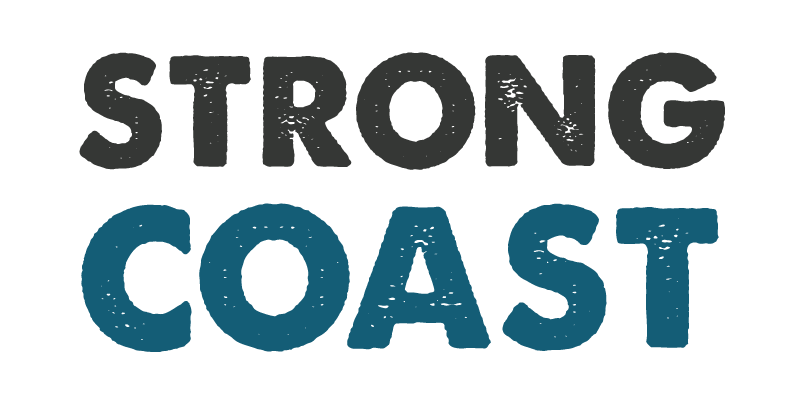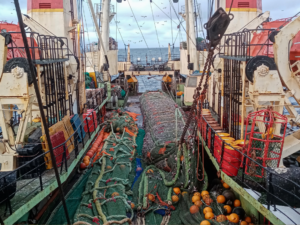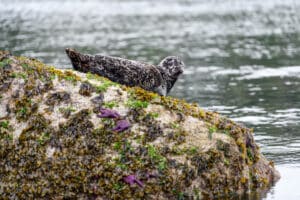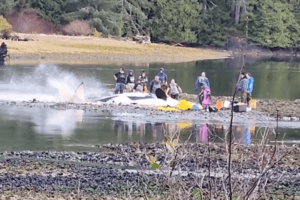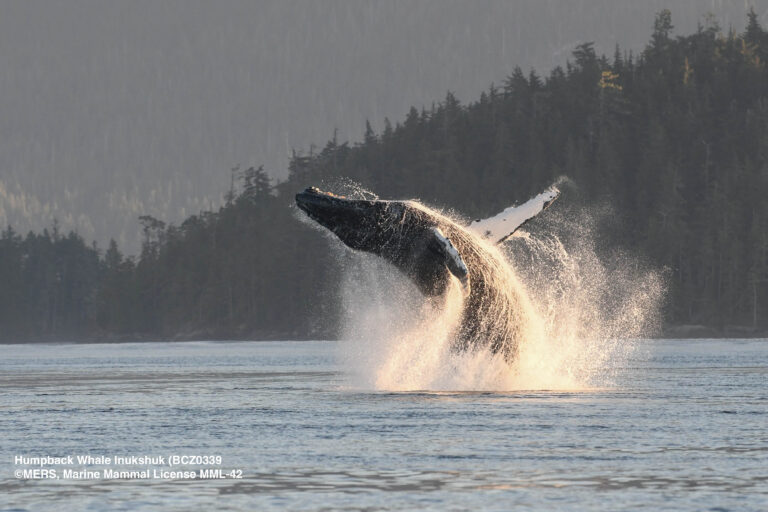
Calling all cetacean fans: a number of BC humpback whales will be featured in the BBC’s popular Planet Earth III series, narrated by Sir David Attenborough. Jackie Hildering, whale researcher and co-founder of the Marine Education and Research Society (MERS), plays an important part in the seventh episode, entitled “Human,” which features humpbacks around Vancouver Island. Hildering spoke with us about the experience of taking part in the iconic environmental show ahead of the episode’s Canadian premiere on April 21st.
“It was so heartening to watch him fall in love with the area and have mirrored back how valuable it was to know the whales of this area as individuals as we do.”
Jackie Hildering, whale researcher and co-founder of the Marine Education and Research Society (MERS)
The BBC first approached Hildering and her team at MERS in 2019 about their humpback feeding research in Kwakwa̱ka̱’wakw Territory, around northeastern Vancouver Island. After an email exchange that ensured the production would be done ethically and respectfully with regards to the whales, Planet Earth III director/producer Fredi Devas came to visit the MERS centre in Port McNeill.
“It was so heartening to watch him fall in love with the area and have mirrored back how valuable it was to know the whales of this area as individuals as we do,” Hildering told us. “It quickly became a partnership with the producer, videographers, and us as the boat operators and researchers.”
The BBC team and MERS spent five weeks between 2021 and 2022 filming together with their humpback ‘ambassadors,’ as Hildering calls them, including Conger, Inukshuk, Slash, CAVU, Ridge, Corporal, Yahtzee, Trinity, Guardian and more (some of these names may be familiar to followers of Hildering’s popular Marine Detective Facebook page).
“For me personally, driving this world-famous crew around with [an] astounding quality of gear was surreal. To hear Sir David Attenborough state the name of one of the whales we nicknamed was mind-blowing to our whole team,” she said, referring to Conger, who has a starring role in the episode.
Trap Feeding
It was MERS’ groundbreaking discovery of an undocumented humpback feeding method that had initially caught the BBC’s interest. Normally, humpbacks ‘lunge feed’ by opening their mouths and lunging at populations of herring.
But in 2011, Hildering witnessed two humpbacks ‘trap feeding’ – feeding with their mouths wide open vertically and nearly completely still. The herring, trying to avoid diving birds, would swim right into the whales’ mouths. Trap feeding is a completely new humpback feeding behaviour which had never been seen before anywhere else in the world.
“We now have documented 32 whales who have learned this strategy used specifically when juvenile herring are less concentrated,” said Hildering, explaining it’s an efficient and low-energy way for the humpbacks to feed on herring.
Whale Poop
The episode primarily focuses on how humpback whales are crucial in sequestering the world’s carbon – and how their feces plays a surprisingly important role. The MERS crew spent many hours with the BBC team capturing whale poop on film to properly explain its significance to the climate.
In a method known as a ‘whale pump,’ whales defecate at surface level and, in doing so, bring nutrients from deep waters to the top of the ocean. Their ‘fecal plumes’ (a scientific term for poop) fertilise phytoplankton, which then photosynthesise by absorbing carbon and creating more oxygen, adding more food for the food web.
And it’s not just their poop that helps with carbon absorption – whales themselves act as carbon sinks. They accumulate carbon in their bodies throughout their lives, and when they die, they literally sink to the bottom of the ocean and take that carbon with them. In fact, every humpback whale sequesters the same amount of carbon out of the atmosphere as 30,000 trees.
“Commercial whaling only ended in BC in 1967 and we almost pushed [them] into extinction.”
Jackie Hildering, whale researcher and co-founder of the Marine Education and Research Society (MERS)
“We humans are so damn lucky to have a second chance with these whales we used to overtly kill,” Hildering told us. “Commercial whaling only ended in BC in 1967, and we almost pushed [them] into extinction.”
“With the comeback of Humpbacks, they benefit our own survival through carbon capture, let alone what they offer us in wonder and reflection on how quickly human values can change,” she said, noting how humans have gone “from killing them without consideration of ecosystem-wide consequences, to caring about whales as individuals.”
Humpback Conservation
Hildering is hopeful that the episode will communicate the ingenuity of these incredible creatures, as well as encourage conservation measures to protect them for generations to come.
“It’s hoped that the [Planet Earth III] segment increases awareness about their importance and that of the cold waters of British Columbia in sustaining them and that this translates into positive actions,” she said, explaining there is a misconception that humpbacks feed primarily in warmer waters like Mexico and Hawaii when actually crucial feeding takes place in BC waters.
“Our consumer and voter decisions directly impact vessel traffic, entanglement risk, and climate change with recent research (in which we were involved) showing how warming waters impact the wellbeing of these giants.”
Jackie Hildering, whale researcher and co-founder of the Marine Education and Research Society (MERS)
She also wants viewers watching to realize they have an important role to play in the protection of humpbacks. “Our consumer and voter decisions directly impact vessel traffic, entanglement risk, and climate change with recent research (in which we were involved) showing how warming waters impact the wellbeing of these giants,” she said. Earlier this year, MERS was part of a study that showed a 20% decline in the population growth of North Pacific humpback whales resulting from a marine heat wave.
Some of the humpback ambassadors featured in the episode have been the victims of incidents like the vessel strikes and entanglement Hildering mentioned. Slash displays propeller scars on her side, while Argonaut shows evidence of entanglement with fishing gear.
“We wanted to increase awareness, wonder, and action that benefits whales as barometers of human values, and indicators of environmental health,” Hildering concluded.
Premiere Celebrations
The eight-episode series premiered in North America on March 10th, with “Humans.” The humpback whale episode featuring MERS is set to air on April 21st on BBC Earth and providers like Amazon Prime.
MERS will be celebrating their Planet Earth III episode premiere with two free events for the public – online on April 21st from 7:30 to 8:30 pm (register here to attend) and in-person on April 28th from 2:00 to 3:00 pm at the MERS centre in Port McNeill (register here to attend).
The online event will feature speakers like MERS’ own humpback researchers Jackie Hildering and Christie McMillan, BC-based cinematographer Tavish Campbell, who filmed some of the humpback episode, and possibly even the Planet Earth III producer himself, Fredi Devas.
Published with the permission of The Skeena.
